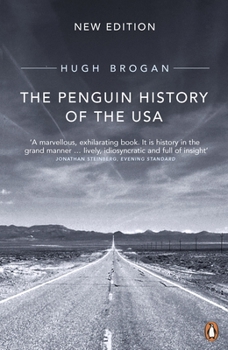The Penguin History of the USA: New Edition
Select Format
Select Condition 
Book Overview
This new edition of Brogan's superb one-volume history - from early British colonisation to the Reagan years - captures an array of dynamic personalities and events. In a broad sweep of America's... This description may be from another edition of this product.
Format:Paperback
Language:English
ISBN:014025255X
ISBN13:9780140252552
Release Date:November 2001
Publisher:Penguin Books
Length:752 Pages
Weight:1.02 lbs.
Dimensions:1.6" x 5.1" x 7.8"
Age Range:18 years and up
Grade Range:Postsecondary and higher
Customer Reviews
5 ratings
Interesting perspective, great details
Published by Thriftbooks.com User , 16 years ago
Having read the existing reviews, I have little to add except that this book delivers quite a few details that are all too seldom mentioned, some of which are quite ironic. For example, I believe I have only read in one other text, and had almost forgotten, that the British parliament revoked the Charter of Massachusetts Bay Colony because of it's tendency to rather savage persecution of Christians of other denominations, most especially Quakers. The irony of this, given that it was the governor of that colony who bequeathed to us the image, made popular by Ronald Reagan, of the "shining city on the hill" is quite powerful. Brogan, to his credit, doesn't attempt to draw such conclusions. But, perhaps because he isn't an American, he is able to lay out such jarring details in a neutral and unslanted manner.
If you only read one book on American history...
Published by Thriftbooks.com User , 20 years ago
you could not do better than Hugh Brogan's. Not only is it immensely readable (and yes, funny) but, contrary to the comments of other reviewers, his outsider's perspective makes this book even more valuable to American readers. His balanced analysis of critical episodes in American history and their relation to broader trends in world history gives the reader a sense of the interdependency of historical development, something all too often absent from American textbooks. Most importantly, his passionate, though never craven, defence of European Enlightenment thinking, so critical in shaping the essence of American political thought and the philosophical underpinnings of its constitutional framework, is essential if one is to truly grasp the causal factors behind the world's first anti-colonial revolution. There can be no doubt, regardless of the temptation to view the period and its ideas through post-modern eyes, the political figures of the time, whether Tory or Whig, Loyalist or Rebel believed in their respective ideas. A failure to understand this simple fact results in a fundamental failure to grasp the great themes of the 18th century and those that have followed. Hugh Brogan's work should be celebrated wherever free people value what truly makes them free.
Penguin History of the United States of America
Published by Thriftbooks.com User , 22 years ago
Brogan's history of the U.S. is well-written and, on the whole, well-researched. I am considering the use of the book in a classroom setting because I am dissatisfied with another English historian's factual innacuracies in an otherwise good book. Brogan, too, makes some factual mistakes that irritate me. For example, he presents Gettysburg as a two-day battle when it was a three-day battle. His mistakes are much less glaring than are Paul Johnson's in his one volume history of the United States, but they are enough to make one ask why English historians writing about American history are too proud to ask an American historian to at least check facts for them before publishing.Despite this, I rated the book at five stars (although I would have rated it at four-and-a-half stars if I could figure out how).
Short(ish) and Succint
Published by Thriftbooks.com User , 22 years ago
Packed with diverting insights and miscellaneous facts, this general history of the US is notable for its sweep, its sensibility and erudition. If you feel the need to understand the various periods in American, the central economic and political factors which drive the continuity and change from one period to another, this shortened history does an excellent job. A couple of interesting facts: Tammany Hall was named after the Indian chief Tammany, who gave William Penn land to start his colony. Tammany gave Penn all the land he could walk in three days. Penn stopped after a day and a half and thanked Tammany for his generosity. But the next generation of Pennsylvanians organized a relay race and grabbed as much land as they could in the day and half that follwed. And the work bunk, or bunkum comes from a representative from South Carolina, who in the House of Representatives, delivered a long speech dealing only with local concerns, boring his fellows politicos. He apologized later, saying that the speech was intended only for "Buncum County." Brogan is particularly adept at drawing incisive portraits of American presidents and leaders. Abraham Lincoln, who may be the most written about American President, is here given new life by Brogan as a man who was a sharp politician, ambitious, steeped in the give and take of democracy -- a side of Lincoln sometimes overlooked in oher biographies. His portraits of Carter, Nixon and Reagan are also insightful.Great reading for the average reader and the history enthusiast and scholar as well. The average reader will appreciate the grace and insight with which he tells the big story, the history enthusiast and scholar will appreciate the odd details, and Brogran's often tangy slant on America and Americans
A rare, truly excellent work
Published by Thriftbooks.com User , 25 years ago
The epitome of a thoughtful work for a non-specialist audience. Wise, witty, ironic, sophisticated, and extremely well-written.




